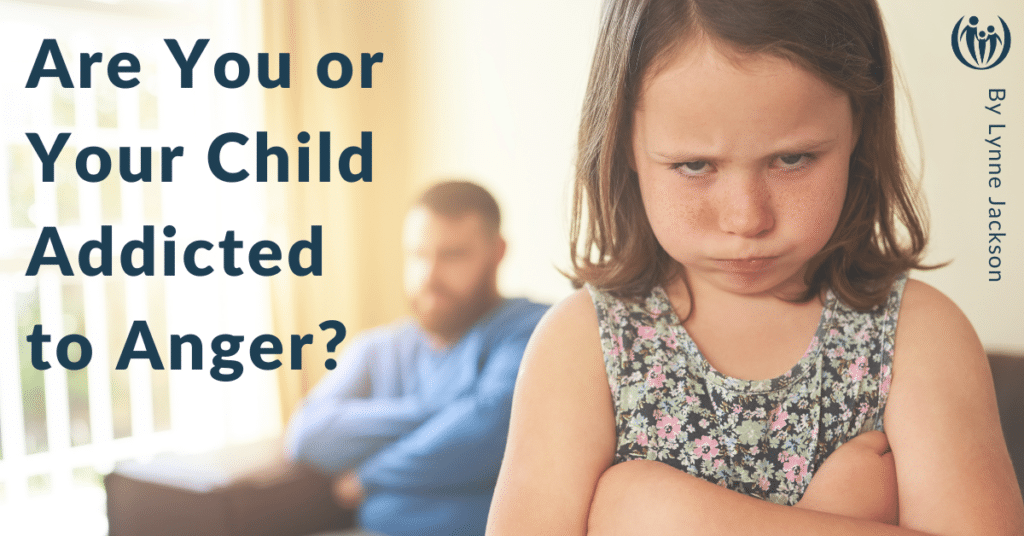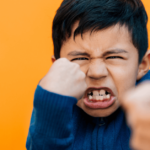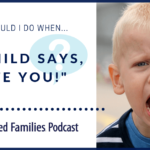
Are You or Your Child Addicted to Anger?

Do you feel like your family has more than your share of conflict and anger? In the stresses of family life, anger can quickly get to the level of yelling, screaming, hurtful words, or even aggression. If that’s your reality, it’s certainly not what you envisioned when you decided to become a parent!
It might sound strange to describe anger as an addiction; however, that paradigm might give valuable insight into why it’s so easy for kids and parents to get stuck in this pattern. Is it possible you or your child are addicted to anger? Let’s find out.
What is an addiction? What is an “anger addiction”?
Addiction is “the state of being compulsively committed to a habit or practice or to something that is psychologically or physically habit-forming…” This could describe anger’s role in a family when it becomes a psychological and physical habit. This habit can be very difficult to break free from when certain situations trigger a very predictable response.
Many parents we coach are desperate to change the frequency and intensity of anger in their home, but they just don’t know how. We haven’t met a parent or child yet who says, “I just love getting angry. It makes me feel great.” Of course not. It’s stressful, discouraging, wreaks havoc in relationships… So WHY do people keep exploding?
Four “payoffs” that make anger really addictive!
Anger researcher Leon F. Seltzer Ph.D. identifies four addictive “payoffs” (benefits) that build habitual, angry reactions.
1. Anger protects us from disclosing vulnerable emotions.
When kids (and adults) experience tangled and confusing emotions that are difficult to express, what often comes out is anger. It feels vulnerable to be anxious, ashamed, sad, embarrassed, disappointed, discouraged, overwhelmed, confused, hurt, or rejected. A typical response is to self-protect by avoiding or hiding those kinds of “soft” emotions under a layer of “prickly” anger. Like substance addiction, people can become dependent on anger to hide and cover for uncomfortable feelings they’re not ready to deal with.
Let’s consider a scenario to make this practical. When your child loses a card game, he might angrily scream at his little sister, “You cheated! I’m not playing with you again!” You might angrily react, “She is NOT cheating! Why in the world do you keep saying that? Go to your room!”
What your son might be feeling is, “I’m discouraged and ashamed that I keep losing to my little sister. I’m dumb!” What you might be feeling is, “I’m confused about why he loses control so easily, and I’m anxious that I don’t know what to do!” But unless these underlying feelings are understood and expressed, the surface anger rules the day, and this cycle will continue with increased intensity in the next game (or any time there is a conflict).
2. Anger soothes us by numbing pain.
One of the brain chemicals secreted during anger works as an analgesic (like Tylenol) to block pain. It’s an excellent chemical if you’re physically threatened because pain slows you down if you need to slug, kick, or run for your life.
But if the threat is purely emotional, the chemicals simply numb the pain of more profound and complex feelings. It might look something like this:
Josie: “Your drawing is stupid. I can’t even tell what it is.”
Ian: “What do you know?! All you do is build stupid Lego planes all day!”
In this simple interaction, Ian’s anger has numbed his probable pain of hurt, rejection, and sadness while also invalidating any merit to Josie’s opinion. Two problems were avoided with one burst of analgesia.
Why Is My Child So Angry All The Time? Ep. 126
Are you trying to understand your child’s constant frustration or angry eruptions? This podcast has insight into what could be underneath your child’s anger. And how to navigate it with grace and kindness.
3. Anger empowers us with a sense of control.
Seltzer states, “I’m convinced that anger is employed universally to bolster a diminished sense of personal power. Contrary to feeling weak or out of control, the experience of anger can foster a sense of invulnerability—even invincibility… In a sense, it’s every bit as much a drug as alcohol or cocaine.”
We see this in children all the time. If a child engrossed in play is told to clean up right now and head immediately to the car, they probably feel powerless in the face of the dominating adult. “NO!! I’m NOT done!” An angry response nicely diminishes their feeling of powerlessness.
4. Anger regulates intimacy.
In a backward sort of way, angry engagements provide a kind of intimacy kids may not get otherwise. As parents and kids feel increasingly disconnected (due to increasing angry encounters), they may seek intense eye contact and verbal engagement, even through more angry interactions. This may be the closest thing a child can get to the eye contact and attention desperately needed.
Suppose your child watches a sibling get affection and affirmation from you with little hope of getting such positive attention themselves. In that case, it probably won’t be long before your struggling child does something negative to get your undivided attention!
So how can you begin to break free from anger addiction?
Here are three ways to start breaking an addiction to anger:
- Recognize what’s in your control. On the most superficial level, anger can be about having a blocked goal and feeling powerless. Having a goal to control your kids is like handing them the keys to your emotions. If kids get sassy or defiant and thwart your “control goal,” anger is the natural result. When you recognize that no one can control another person, consider what you can control. You. So set a goal to take a breath and buy a little time before you respond. That’s a goal you can control. Celebrate out loud if you achieve that goal!
- Develop an emotions vocabulary. If anger covers up vulnerable feelings, learning to say those feelings out loud eliminates the need for a cover-up. So consider this list of examples of vulnerable emotions: anxious, ashamed, sad, embarrassed, disappointed, discouraged, overwhelmed, confused, hurt, and rejected. You can teach your kids those words through conversation, pointing them out in stories you read or shows you watch. Then model exploring your feelings out loud in front of your children. You can make a habit of asking yourself, “What’s going on inside of me?” and sharing it. “I got angry when your argument got intense because I was worried. I was afraid someone would get hurt.” As you all learn to name your feelings and express your needs, angry responses are replaced with more specific, productive words.
- Grow intentional intimacy and joy. Consider: In what ways is it natural for you to express delight in your child? What’s something you and your child enjoy doing together? If you can’t think of something, decide to enjoy something your child enjoys. Then make time for it. Or just determine to make lots of delighted eye contact with your child, and reduce your intense-angry-face discipline.
You can see that none of these strategies bring anger to a screeching halt in your home.
Fools give full vent to their rage, but the wise bring calm in the end. Proverbs 29:11
Notice it doesn’t say the wise bring instant calm. This will be a process of gradual healing. Give yourself lots of grace as you persevere at bringing peace to the anger in your home.
Need more anger-busting skills for your child?
Often when kids seem addicted to anger, there are unseen stresses that feed all the vulnerable feelings that anger protects. There can be a whole host of needs that are not being met. Are they chronically short on sleep? Oversensitive to screen use? Created with a sensitive temperament prone to anxiety? Struggling with learning differences? Dealing with trauma or multiple sources of less intense situational stress, discouragement, or rejection? Or, quite commonly, experiencing sensory overload.
If you prayerfully consider what might be feeding your child’s stress, you can work to soothe some of those stressors and equip them with the skills they need to regulate their big feelings. Struggling kids have a deep need to be encouraged and empowered with “anger-busting skills.” We want to equip you with the practical help you need!
After years in the making, we are thrilled to offer you Sensitive & Intense Kids: Navigating Parenting Challenges with Purpose and Hope. In this seven-session course, you’ll learn how to move out of the STRESS CYCLE and into a HEALING CYCLE with your sensitive or intense child. We call this process the Road to Hope. The difference between life in these two cycles is a game changer. Don’t miss out! The moderated version of the course starts March 6th!

Do you have a child with EXTRA needs?
Parenting isn’t easy, but when you’ve got an extra INTENSE or SENSITIVE child with big feelings… it’s even harder.
The Sensitive and Intense Kids online course will equip you to parent well, even with these unique kiddos.





